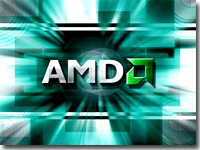AMD Jumping on the Android Bandwagon
AMD is recruiting software engineers to develop drivers for Google's Android OS.
It was only a matter of time before AMD followed Nvidia's lead and finally jumped onto the Android bandwagon, as the company is now recruiting engineers to create chipset drivers for Android. According to unnamed sources, the nation's second largest CPU manufacturer is now looking to offer notebook and tablet partners chipset solutions supporting Google's popular mobile platform.
"The Linux Base Graphics team is looking for Android Driver Development engineers to help us evolve our driver stack for new platforms and in line with the development trends in the Android ecosystem," reads the job description. "Experience with video decode acceleration within the Android web browser or video player application would be an asset. Experience with webm and/or OpenMax would be a bonus."
The company confirmed its interest in Android during an interview back in mid-March. Neal Robison, senior director of content and application support at AMD, indicated that offering support for Google's mobile platform makes a lot of sense for the company. "That is something we will be investigating as we take our Fusion architecture [into new markets] and we are able to create versions of this architecture for lower power environments that would work quite well for, perhaps, a tablet using this operating system."
But is AMD's entry a little too late? As it stands now, Nvidia's Tegra 2 seems to be the dominant solution in current Android-based tablets, only to be followed by solutions from Samsung, Qualcomm and Texas Instruments. Intel is even reportedly working on an Android-ready Atom chipset. That said, AMD certainly has some catching up to do to say the least.
The news arrives with additional reports that MSI is gearing up to market its latest tablet using AMD's 40-nm low-power Brazos APUs-- probably the revised Ontario with HD support and a 5W thermal design. Acer has reportedly already placed Brazos APU orders with AMD back in January, seemingly unable to wait on AMD's Ontario replacement, the 28-nm Wichita 2nd-generation APU, which isn't even expected to arrive until the first half of 2012.
It's likely that both companies will showcase their Brazos-based tablets this June at COMPUTEX 2011. E3 2011 also takes place in June, making it one of the busiest months of the year both on a hardware and a software front.
Get Tom's Hardware's best news and in-depth reviews, straight to your inbox.

Kevin Parrish has over a decade of experience as a writer, editor, and product tester. His work focused on computer hardware, networking equipment, smartphones, tablets, gaming consoles, and other internet-connected devices. His work has appeared in Tom's Hardware, Tom's Guide, Maximum PC, Digital Trends, Android Authority, How-To Geek, Lifewire, and others.
-
sabot00 This will be quite interesting, an excellent low-power x86 CPU with android.Reply
soldier37Is there a android bandwagon? I didnt think so.. Iphone FTW.You realize the Apple A4 chip in the iPhone 4 is already tons behind competitors right?
800Mhz vs Dual Core 1.2GHz
PowerVR SGX 535 vs SGX 540's, GeForce ULPs, and Adreno 220s. -
piesquared Tegra is ARM. AMD doesn't have an ARM architecture, they have x86. They are talking about driver development for X86 on Android. So it has nothing to do with NV as they don't have an x86 license. Apples and oranges, cats and dogs, night and day.Reply -
N.Broekhuijsen soldier37Is there a android bandwagon? I didnt think so.. Iphone FTW.Get your head out of your ***Reply -
mosu AMD finally understood the world is moving towards mobility and I assume that's why they've changed the CEO.Better later than never!Also I think 40nm chips are not suitable for low power solutions, so wait till 28nm goes mainstream.Reply -
pelov piesquaredTegra is ARM. AMD doesn't have an ARM architecture, they have x86. They are talking about driver development for X86 on Android. So it has nothing to do with NV as they don't have an x86 license. Apples and oranges, cats and dogs, night and day.Reply
Just do what everyone else does with ARM... pay somebody else for every chip you make ;P
I don't see x86 doing well in the phone/tablet market; at least not in the near future. -
ben850 sabot00This will be quite interesting, an excellent low-power x86 CPU with android.You realize the Apple A4 chip in the iPhone 4 is already tons behind competitors right?800Mhz vs Dual Core 1.2GHzPowerVR SGX 535 vs SGX 540's, GeForce ULPs, and Adreno 220s.Reply
You must have forgotten about the iPhone 5 coming out this summer/fall. Either way, the iPhone can run smoother with less power. Yes it is a more controlled environment, but that is what I want in my personal phone.
Android phones are cool and all, with their beefy CPU's and (nearly) full customization, but only if you sit at home all day next to a wall charger.
tl;dr I'll take an efficient product over a raw/uncontained one any day.
